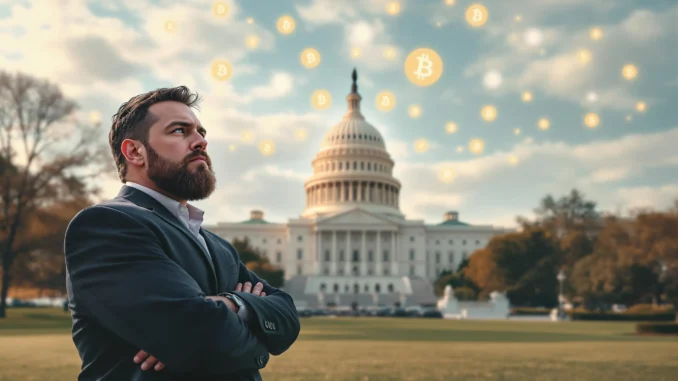
Is the U.S. government’s grand plan for a crypto reserve just a lot of hot air? That’s the explosive claim from none other than Arthur Hayes, the co-founder of BitMEX. In a recent social media blast, Hayes didn’t mince words, dismissing the entire initiative as mere “rhetoric.” For crypto enthusiasts and investors watching every government move, Hayes’s stark assessment raises critical questions. Let’s dive into why this influential figure believes the US Crypto Reserve is nothing more than empty promises and what it means for the future of Bitcoin and the broader crypto market.
Why Does Arthur Hayes Call the US Crypto Reserve ‘Empty Talk’?
Arthur Hayes, known for his often provocative and insightful market commentary, didn’t hold back in his recent post on X. His central argument boils down to a fundamental lack of funding and authority. He argues that without two critical components, the US Crypto Reserve is simply not viable:
- Congressional Approval for Funds: Hayes points out that for the government to actually purchase significant amounts of Bitcoin or other cryptocurrencies, they need money. And to get that money, they need the green light from the U.S. Congress. As of now, there’s no indication that such approval is in place or even being seriously considered.
- Gold Price Revaluation: Hayes also suggests a more unconventional, but potentially impactful, route – a reevaluation of gold prices. Historically, gold has played a crucial role in monetary systems. If the U.S. government were to significantly increase the official value of its gold reserves, it could theoretically create more fiscal space. However, this is a complex and politically charged maneuver, and again, there’s no sign of this happening.
In essence, Hayes is saying, “Where’s the money?” Without a clear funding mechanism, whether through traditional appropriations or a radical monetary policy shift like gold revaluation, the idea of a substantial US Crypto Reserve remains just talk – a strategy without substance.
What are the Implications of ‘Empty Talk’ for Bitcoin and Crypto Regulation?
If Hayes is right, and the US Crypto Reserve is indeed just rhetoric, what are the potential consequences for the crypto market, particularly for Bitcoin and the ongoing landscape of crypto regulation?
- Market Sentiment: Announcements about government crypto initiatives can often boost market sentiment. The idea of a major government player entering the crypto space as a buyer could inject significant confidence. However, if these plans are perceived as hollow, it could lead to disappointment and potentially dampen investor enthusiasm.
- Regulatory Uncertainty: The lack of concrete action on a crypto reserve could reflect a broader uncertainty within the U.S. government regarding its approach to cryptocurrencies. While some agencies may talk about embracing crypto, the absence of funding and clear policy could signal a deeper ambivalence or even resistance within the political establishment.
- Price Volatility: The crypto market is known for its volatility, and pronouncements from influential figures like Arthur Hayes can amplify these swings. His dismissal of the US Crypto Reserve could contribute to short-term price fluctuations, especially if other market participants share his skepticism.
- Long-Term Strategy Questioned: Hayes’s comments challenge the narrative that the U.S. is proactively developing a comprehensive strategy for digital assets. If the crypto reserve plan is indeed unfunded, it raises questions about the government’s genuine commitment to integrating crypto into the financial system.
Is Government Bitcoin Acquisition Really Necessary or Feasible?
Beyond the immediate debate about whether the US Crypto Reserve is genuine or not, a more fundamental question arises: Is it even necessary or practically feasible for governments to accumulate Bitcoin in the first place? Let’s consider some points:
| Argument For Government Bitcoin Acquisition | Argument Against Government Bitcoin Acquisition |
|---|---|
| Strategic Diversification: Some argue that holding Bitcoin could diversify national reserves, reducing reliance on traditional assets and potentially hedging against inflation or economic instability. | Market Manipulation Concerns: Large-scale government buying could be seen as market manipulation, artificially inflating prices and creating an uneven playing field. |
| Embracing Innovation: Acquiring Bitcoin could signal a government’s commitment to technological innovation and its willingness to engage with the evolving digital economy. | Security and Custody Risks: Storing and securing vast amounts of Bitcoin poses significant security challenges for governments, making them potential targets for cyberattacks. |
| Geopolitical Influence: In a future where digital assets play a larger role, governments holding significant Bitcoin reserves might gain geopolitical leverage. | Volatility and Risk Management: Bitcoin’s inherent volatility makes it a risky asset for national reserves, requiring sophisticated risk management strategies. |
| Future-Proofing Finances: As the world moves towards digital currencies, holding Bitcoin could be seen as a way to future-proof a nation’s financial reserves. | Ethical and Philosophical Objections: Some argue that governments should not be involved in speculative assets like Bitcoin, and that it goes against principles of sound monetary policy. |
What Actionable Insights Can We Take From Hayes’s Bold Statement?
Arthur Hayes’s critical take on the US Crypto Reserve offers valuable insights for crypto investors and observers:
- Don’t Take Government Announcements at Face Value: Hayes’s skepticism serves as a reminder to look beyond official pronouncements and examine the underlying substance and feasibility of government initiatives in the crypto space.
- Focus on Concrete Actions, Not Just Words: Pay attention to actual legislative changes, budget allocations, and policy implementations rather than just verbal statements or announcements. Congressional approval and funding are key indicators of genuine commitment.
- Market Analysis Beyond Headlines: Consider the perspectives of experienced market participants like Arthur Hayes who offer critical analysis and challenge prevailing narratives. Don’t get swept up in hype or optimistic headlines alone.
- Understand the Regulatory Landscape is Still Evolving: The crypto regulation environment is far from settled. Hayes’s comments highlight the ongoing uncertainties and the potential gap between stated intentions and actual government action.
- Stay Informed and Adaptable: The crypto market is dynamic and influenced by a multitude of factors, including government policies. Staying informed, being adaptable, and considering diverse viewpoints are crucial for navigating this evolving landscape.
Conclusion: Is the US Crypto Reserve a Mirage or a Future Reality?
Arthur Hayes’s blunt assessment paints a picture of the US Crypto Reserve as potentially a mirage – a lot of talk with little backing. His argument that the government currently lacks the funding and authorization to meaningfully acquire Bitcoin is a stark reality check. Whether this situation will change remains to be seen. Congressional action, a shift in monetary policy, or a fundamental change in government attitude towards Bitcoin could alter the equation. For now, Hayes’s words serve as a powerful reminder to approach government crypto initiatives with a healthy dose of skepticism and to focus on tangible actions rather than just optimistic pronouncements. The future of government Bitcoin involvement, and the reality of a US Crypto Reserve, remains an open and intensely debated question in the ever-evolving world of cryptocurrency.



